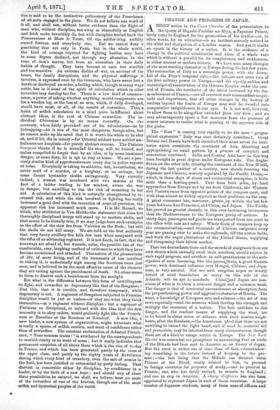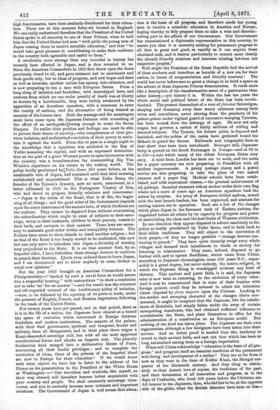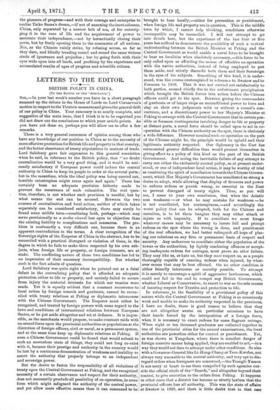CHANGE AND PROGRESS IN JAPAN.
ABRIEF notice in the Court Circular of the presentation to the Queen of Higashi-Fushimi-no-Miya, a Japanese Prince, lately come to England for the prosecution of his studies—or, in other words, for an education—is an incident scarcely noticed in the whirl and dissipation of a London season. And yet it marks an epoch in the history of a nation. It is the evidence of a change in the political constitution and ideas of a whole race which is without a parallel for its completeness and suddenness, in either ancient or modern history. We have seen many changes of the most startling character in Europe during the last few years. The restoration of Italy as a sovereign power, with the down- fall of the Pope's temporal rule,—the collapse and utter ruin of the first military power in Europe,—and the equally sudden and unanticipated resuscitation of the German Empire under the con- trol of Prussia, the territories of the latter increased by the dis- memberment of France,—are all events of such transcendent magni- tude and importance, that all other changes in the destiny of nations beyond the limits of Europe may well be dwarfed into comparative insignificance in our eyes. It is not well, however, to allow these to be altogether excluded from our view ; and we may advantageously spare a few moments from the pressure of nearer interests to realize what is passing at the opposite side of the globe.
The " East " is ceasing very rapidly to be the mere " geogra- phical expression " Italy was once derisively considered, Great Britain and Russia have both stretched their arms across the terri- tories which constitute the continent of Asia, absorbing and appropriating no small portion by a process of conquest and annexation combined. India and Central Asia have in this way been brought in great degree under European rule. The Anglo- Saxon on the other side, crossing the continent of the New World, during the last quarter of a century, now stands fronting the Japanese and Chinese, scarcely separated by the Pacific Ocean,— which, in these days of steam and commercial enterprise, is little more than a herring-pond. Thus from both sides, by land approaches from Europe and by sea from California, the Western and Eastern races from opposite points of the compass meet, and with ideas almost as widely opposed as their positions on the map. A great commerce has, moreover, grownup within the last few yesis between San Francisco, and China, and Japan. The Pacific has proved no greater obstacle to this ever-increasing intercourse than the Mediterranean to the European group of nations. In thirty days, passengers and goods are transported from one coast to the other with ease and safety. Whole fleets of steamers keep up the communication,—and thousands of Chinese emigrants every year are passing over to make the railroads, till the cotton fields, and work the sugar plantations of the .United States, supplying and cheapening their labour market.
That our descendants there and the crowds of emigrants from our own shores which annually swell their numbers, should rejoice in such rapid progress, and overflow in self-gratulations at the anti- cipation of soon becoming, like the parent,State, a great Eastern power, with dominant influence over Mongol, Chinese, and Japa- nese, is very natural. Nor are such sanguine hopes so utterly devoid of solid foundation as many on this side of the Atlantic will be apt to conclude. China/and Japan are con- scious of what is to them a common danger and a common want. The danger is that of territorial encroachment or absorption from the preponderating power and aggressive character of Russia. The want, a knowledge of European arts and sciences—the art of war more especially—and the sciences which develop the strength and multiply the resources of a nation. The beat antidote to this danger, and the readiest means of supplying the want, are to be found in closer union or alliance with their nearest neigh- bours, after the Russians,—the Americans. !And that these are not unwilling to extend the right hand, and if need be material aid and protection, may be inferred from many circumstances, though these are of a kind to escape notice in Europe. The New York Herald was somewhat too precipitate in announcing that an uncle of the Mikado had been sent to America as an Envoy of Japan. But the error is rather one of time than of fact,—foreshadow- ing something in the future instead of keeping to the pre- sent ; —the fact being that the Mikado has directed three Princes of the Blood, nearly related to him, to proceed to foreign countries for purposes of study,—one to proceed to Prussia ; one, who has lately arrived, to remain in England ; and one to stop in America. A charge d'affaires has also been appointed to represent Japan in each of these countries. A large number of Japanese students, many of them sous of officers and
high functionaries, have been similarly distributed for their educa- tion. There are at this moment forty-six located in England.
We can easily understand therefore that the President of the United States spoke in all sincerity to one of these Princes, when he told him that the United States had seen " with pride the young men of Japan coming there to receive scientific education," and that "he would take great pleasure in contributing to make their residence in the country both agreeable and useful to them."
A revolution more strange than any recorded in history has recently been effected in Japan, and is thus revealed to us.
Since the American Commodore in 1853 first threw open the doors previously closed to all, and gave entrance not to merchants and their goods only, but to ideas of progress, and new hopes and fears as well as interests, another nation has sprung into existence, and is now preparing to run a race with European States. From a long sleep of isolation and feudalism, with stereotyped laws, and customs from which no one under penalty of death was at liberty to deviate by a hairsbreadth, they were rudely awakened by the apparition of an American squadron, with a summons to enter the comity of nations, and the alternative of being treated as enemies of the human race. Both the message and the messengers must have come upon the Japanese Daimios with something of the effect of an earthquake/strong enough to rouse the Seven Sleepers. To realize their position and feelings one must be able to picture their dream of security,—the completeness of their pre- vious isolation, and undisturbed conviction of their power to main- tain it against the world. From this to pass in a single night to the knowledge that a squadron was anchored in the Bay of Yeddo menacing the capital, and with an expressed determina- tion on the part of a great Western power to open intercourse with the country, was a transformation far transcending Rip Van Winkle's experience on his return to the waking world. The policy loudly proclaimed by:Taiko Sama 250 years before, as the unalterable rule of Japan, had remained until that fatal morning undisturbed and unquestioned. This is what Taiko Sama, the founder of the Tycoon's dynasty, now no more, announced, in a letter addressed in 1591 to the Portuguese Viceroy of Goa, who had dared to propose friendly relations and intercourse : —" Japan is the realm of the Kami, that is of Sin, the begin- ning of all things ; and the good order of the Government depends upon the exact observance of the ancient laws, of which theKami are the authors. They cannot be departed from without overturning the subordination which ought to exist of subjects to their sove- reign, wives to their husbands, children to their parents, vassals to their lords, and servants to their masters. These laws are neces- siry to maintain good order within and tranquillity without. The Fathers have come to these islands to teach another religion ; but as that of the Kami is too deeply rooted to be eradicated, this new law can only serve to introduce into Japan a diversity of worship very prejudicial to the State. It is on that account that, by an Imperial edict, I have forbidden these strange doctors to continue to preach their doctrine. I;have even ordered them to leave Japan, and I am determined not to allow anybody to come thither to retail new opinions."
But the year 1853 brought an American Commodore for a Plenipotentiary—" backed by such a naval force as would secure him a respectful hearing," with instructions " to show a resolution not to take 'no' for an answer "—and the result was the reluctant and oft-repented reversal of the traditionary policy of isolation, —soon to be followed by the opening of its ports to trade, under the pressure of English, French, and Russian negotiators, following in the track of the United States.
Not twenty years have yet passed, and in that period, short as it is in the life of a nation, the Japanese have cleared at a bound the space of centuries which intervened in Europe between feudalism and modern institutions. The mayors of the palace, with their dual government, spiritual and temporal, feudal and military, have all disappeared, and in their place there reigns a Kami-descended sovereign still, but with all the most approved constitutional forms and checks on despotic rule. The princely feudatories have merged into a deliberative House of Peers, renouncing all their feudal privileges ; and to complete the revolution of ideas, three of the princes of the Imperial blood are now in Europe for their education ! If we would know with what object, we have but to listen to the address of the Prince on his presentation to the President at the White House at Washington :—" Our travellers and students, like myself, on their way abroad, will hereafter become better acquainted with your country and people. We shall constantly encourage inter- course, and aim to annually increase more intimate and important relations. The Government of Japan is well aware that educa- tion is the basis of all progress, and therefore sends her young men to receive a scientific education in America and Europe, hoping thereby to fitly prepare them to take a wise and discrimi- nating part in the affairs of our Government. Our Government has commissioned a diplomatic representative to this country, to assure you that it is earnestly seeking for permanent progress in all that is great and good, as rapidly as it can acquire these cherished ends, and it desires particularly to cement more closely the already friendly relations and interests existing between our respective peoples."
Well might the President of the Great Republic hail the arrival of these students and travellers as heralds of a new era for their nation, in terms of congratulation and friendly courtesy ! The world has never before seen so great a change in so brief a space as the advent of these Japanese Princes demonstrates. It reads more like a description of the transformation-scene of a pantomime than sober history,—yet history it is. Within the last ten years the whole social and political fabric of the State has been revolu- tionized. The present descendant of a race of fainéant Sovereigns, sleeping and dreaming away their weary existence among their wives and concubines, never stirring from the precincts of his palace-prison under vigilant guard of successive usurping Tycoons, has been roused. from the lethargy of ages. He now not only reigns, but governs a nation of thirty millions of willing and devoted subjects. The Tycoon, his former jailor, is deposed and. banished, and the nobles of the realm have gathered round the Mikado to guard the throne. Railroads and telegraphic lines in that short time have been introduced. Stranger still, Japanese Scrip is quoted on the Stock Exchanges in Europe—and at 98 to to 100—a rate which many of the oldest European States may envy. A mint from London has been set to work, and the notes for a paper currency are now preparing in Frankfurt with all modern improvements. A penny postage stamp and a postal service are also preparing, to take the place of two naked. runners and a paper bag. Medical schools have been estab- lished, and with anatomical classes,—the greatest achievement of all, perhaps. Ironclad steamers ride at anchor under their own flag where not a score of years ago an American squadron took the nation by surprise. An army of European-drilled natives, armed with the best breech-loaders, has been organized, and arsenals for casting cannon are in operation. Such are a few of the changes which place Japan in the foremost rank of Eastern nations, dis- tinguished before all others by its capacity for progress and power of assimilating the ideas and the best fruits of Western civilization..
In one direction they appear disposed to adhere resolutely to the policy so loudly proclaimed by Taiko Sama, and to hark back to- their oldest traditions. They still object to the conversion of, their people,—if they no longer prohibit " strange doctors con- tinuing to preach." They have quite recently swept away whole villages and doomed their inhabitants to death or slavery for' listening to missionaries. They seem, indeed, disposed to go- further still, and to uproot Buddhism, which came from China, according to Japanese chronologists, some 500 years B.C., super- seded in a great degree, but never entirely, the native religion, in which the Supreme Being is worshipped without any kind of, idolatry. This ancient and purer faith, it is said, the Japanese ruler is now bent on restoring, to the exclusion of every other_ And it may be remembered that in none of their treaties with foreign powers could they be induced to admit the toleration. clause imposed by force majeure upon the Chinese. Looking to the sudden and sweeping character of the changes above enu- merated, it might be imagined that the Japanese, like the inhabi- tants of Honolulu, had simply fallen under the away of certain enterprising Americans, who had obtained sufficient influence to revolutionize the State, and place themselves in office for the administration of a constitution on an European model. But nothing of the kind has taken place. The Japanese are their own regenerators, although a few foreigners have been taken into their service. And no better proof is needed than this tendency to revert to their ancient faith, and cast out that which has been so long naturalized among them as a foreign importation.
When will China acknowledge " education is the basis of all pro- gress," and progress itself an essential condition of the permanent well-being and development of a nation ? They are as far from it now as they were in the days of Kublai Khan, the Mongol con- queror of the thirteenth century. And they cling as obstin- ately to their Asiatic love of repose, the traditions of the past, and their detestation of all innovation and progress, as in the days of Confucius, who lived 500 years, before the Christian era. All honour to the Japanese, then, who bid fair to be, at the opposite side of the globe, what the British islanders have been on this- the pioneers of progress—and with their courage and enterprise to realize Taiko Sama's dream,—if not of annexing the inert colossus, China, only separated by a narrow belt of sea, of far outstrip- ping it in the race of life and the acquirement of power to maintain their independence,—not by hermetically closing their ports, but by freely opening theni to the commerce of all nations. Not, as the Chinese vainly strive, by refusing access, so far as they dare, and blindly treading round and round the same vicious circle of ignorance and prejudice ; but by going forth with their eyes wide open into all lands, and profiting by the experience and accumulated results of ages of progress and scientific culture.




































 Previous page
Previous page